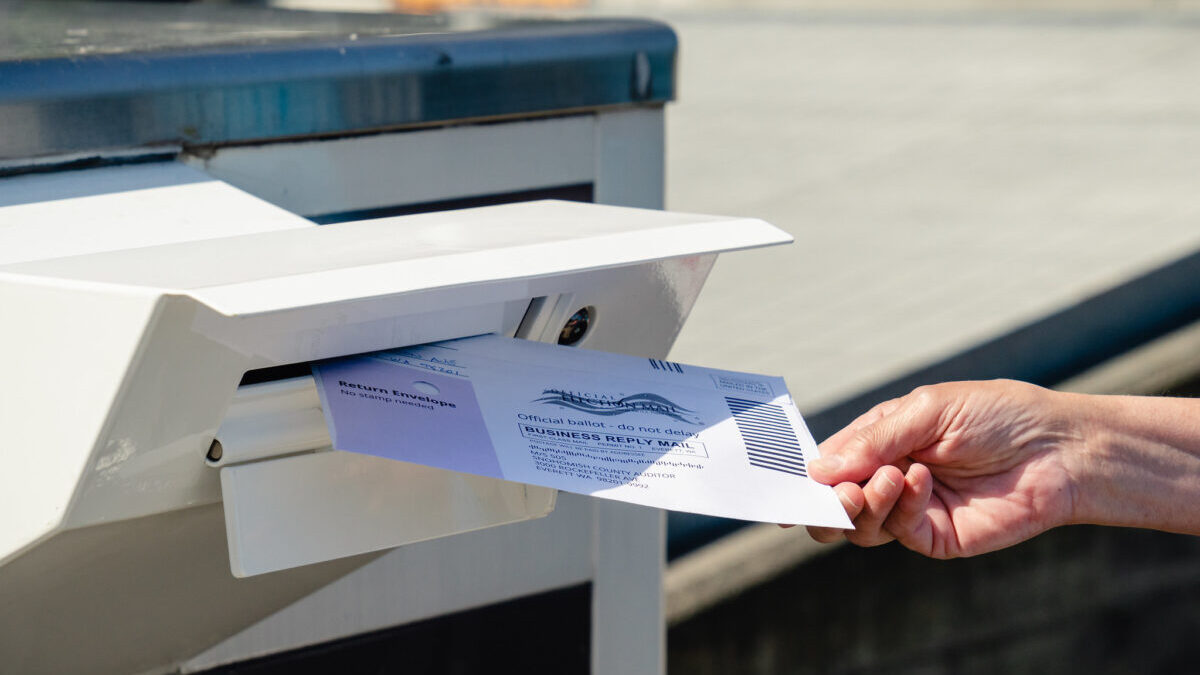While the GOP and conservative media have largely moved on from Arizona gubernatorial candidate Kari Lake and the systemic failures that occurred in Maricopa County on Nov. 8, court testimony and eyewitness reports from the Lake trial include allegations that Arizona’s largest county violated state law by failing to implement chain-of-custody documentation for Election Day ballots, resulting in a mysterious 25,000 extra votes added to Maricopa County’s official tally within a 24-hour period — more than the margin of victory between Lake and gubernatorial victor Katie Hobbs.
It was about 10:00 on election night when Maricopa County’s ballot tabulation vendor, Runbeck Election Services, received its first truckload of Election Day drop box ballots. While Runbeck received seven truckloads total (the last was completed about 5 a.m. the following morning), Runbeck staff thought it odd the deliveries did not come earlier throughout the day. But that wasn’t the only glitch. There were no chain-of-custody forms delivered with the ballots, a stark departure from typical procedure.
According to Runbeck employee Denise Marie, prior to Nov. 8, drop box ballots were “delivered in red bins with a chain of custody form” from the Maricopa County Tabulation and Election Center (MCTEC), which listed how many ballots were delivered.
But on election night, “instead of receiving the ballots in red bins, the ballots from the drop boxes had been placed in mail trays and loaded onto mail cages. MCTEC did not include the Maricopa County Delivery Receipt forms with any of the Election Day drop box ballot deliveries. There were no chain of custody forms with the ballots and no count of the number of ballots that were delivered,” Marie wrote in a sworn affidavit.
Maricopa County Co-Director of Elections Reynaldo Valenzuela even testified that while the county’s election workers count drop box ballots and record the counts on documents as required by law prior to Election Day, they did not count the ballots retrieved from drop boxes on Election Day itself. During the Lake trial, Valenzuela was asked whether Maricopa County election officials know the precise number of drop box ballots on Election Day, and he told the court, “On Election Day, no, because we’re not doing drop box courier process at that time. It’s a different process for Election Day.”
According to Lake attorney Kurt Olsen, this is in direct violation of Arizona state statute, which requires the county recorder to maintain records that log the chain of custody for ballots “during early voting through the completion of provisional voting tabulation.”
Per Arizona’s Election Procedures Manual, when ballots are taken from drop boxes, they must either be counted at the local vote center or be placed in secure ballot transport containers to be taken back to the county for tabulation. When the county recorder or elections official opens the container, he or she must count the number of ballots inside and note it on a retrieval form.
Because Maricopa County tabulators received more Election Day drop box ballots than they had ever received before, as County Recorder Stephen Richer testified, they removed the ballots from the ballot transport containers without counting or recording the number on a retrieval form for each drop box, as witnessed by Republican poll watcher Leslie White. This is a violation of the chain-of-custody requirements the county recorder is tasked with implementing.
The ballots were then put in mail trays and loaded onto mail cages, which were then put on trucks and delivered to Runbeck to be scanned and counted, according to supply-chain auditor and Lake trial witness Heather Honey. And notably, according to Marie’s sworn affidavit, this loading of ballots into the trucks also occurred without any documentation or record of the number of ballots on each.
Since Maricopa County failed to create its own chain-of-custody documents for the Election Day drop box ballots according to Marie, Runbeck made its own (called “MC Inbound Receipt of Delivery Forms“), which logged the seven truckloads of drop box ballots on election night. On the delivery forms, Runbeck estimated the total number of Election Day drop box ballots to be 263,379 by multiplying the maximum number of ballots a mail tray can hold by the number of trays received, as Honey explained to The Federalist.
Runbeck CEO Jeff Ellington gave his staff a similar estimate of the number of ballots received via an email on Nov. 9, saying, “we started getting mail packets dropped off from Maricopa around 10pm last night and received mail packets about every hour through sunrise this morning. Likely between 250 and 275K packets were dropped off at the polls yesterday.”
At a press conference that evening, Richer affirmed Runbeck’s estimate by saying the county had received an unprecedented 275,000 drop-off ballots on Election Day. That same day, Maricopa County reported the total number of ballots cast in the 2022 general election to the Arizona Department of State: 1,136,849 ballots, with 407,664 ballots left to count — 1,544,513 ballots total.
However, on that same day, around 5:30 p.m., Maricopa County asked Runbeck to calculate the total number of Election Day drop-off ballots received, according to Marie, who was tasked with running the tabulation herself. Marie found that Runbeck’s records showed 298,942 drop box ballots had been received and scanned on Election Day.
As a result of such a discrepancy between the estimate and the official tally, Maricopa County sent a new vote tally to the Arizona secretary of state’s office on Nov. 10 (earlier that day, Richer had sent an email to the Maricopa County Board of Supervisors admitting he could not reconcile the differences between the county’s numbers and the secretary of state’s listing, demonstrating that even the supposed expert official in charge of the counting process couldn’t figure out where the extra ballots came from). Instead of the original 1,544,513 total ballots reported for the 2022 general election in Maricopa County, the secretary of state’s website now listed 1,569,603, a more than 25,000-vote discrepancy with no explanation. That same day, Maricopa County gave another press conference, stating it had received 292,000 Election Day drop box ballots without batting an eye.
What This Means
Arizona law requires the county recorder to show the origins and chain-of-custody documents for every drop box ballot obtained. According to Runbeck employee Denise Marie, Maricopa County violated state law by not counting and not recording the number of ballots retrieved from each drop box and transferring an unknown quantity of ballots from MCTEC to Runbeck with no chain-of-custody documentation. Because of this failure, no records exist to dispute or reconcile the discrepancy between the number of ballots Runbeck first reported (263,379) and its final tally (298,942), a more than 35,000-vote change. As Olsen remarked in his closing argument for the Lake trail, “If you don’t have a count from MCTEC when those ballots are being transported to Runbeck, how do you know whether that count is secure?”
Nor does there appear to be an explanation for how Maricopa County was able to add more than 25,000 ballots to its final tally. That addition is more than Hobbs’ margin of victory, which was about 17,000 votes.
“On November 9th, the reported count is 25,000 ballots less, which is beyond the margin here, than on November 10th,” Olsen said. “So the day after the election, they put out what the count is and then magically 25,000 ballots appear on November 10th, and well, hey, that’s the race.”
While part of the argument Lake’s attorneys used in their lawsuit seeking to challenge Arizona’s gubernatorial election was that Maricopa County violated its own Election Procedural Manual by failing to implement chain-of-custody documentation for transferring Election Day drop box ballots from MCTEC to Runbeck, Arizona Superior Court Judge Peter Thompson rejected the claim due to the county’s assertion that such chain-of-custody documents exist, even though it failed to produce them. At the time of the trial, Maricopa County hadn’t fulfilled a public records request for the documents.
But while such documents do exist for drop box ballots counted prior to Election Day, no such chain-of-custody paperwork exists for the Election Day drop box ballots themselves, Honey reiterated to The Federalist. The judge did not consider this alleged violation of state law and ruled against Lake’s challenge, saying she failed to present clear and convincing evidence of widespread misconduct.
Arizona has an impossibly high bar for overturning elections on the grounds of misconduct, as the judge himself noted. Lake not only had to allege misconduct but intentional misconduct, such to affect the outcome of the election. Lake has since filed two appeals — one with an appeals court, the other with the Arizona Supreme Court. The appeals court agreed to expedite her case.
When asked about its alleged failure to implement chain-of-custody documentation for the Nov. 8 election, Communications Manager for the Maricopa County Elections Department Matthew Roberts told The Federalist: “There are robust tracking and security procedures in place to document and ensure proper chain-of-custody of early ballots on Election Day. These policies and procedures were followed on Election Day, as well as throughout the early voting period. At no point during the process were chain of custody policies broken or procedures not followed and documented.”
The Maricopa County Elections Department did not respond to The Federalist’s request for documentation of the chain-of-custody process for the Election Day drop box ballots.
Update: After publication, a representative from the Maricopa County Board of Supervisors emphasized that the judge did not rule in favor of Kari Lake’s election challenge, asserted that ballot count estimates fulfilled chain-of-custody requirements, and noted that witnesses disagreed with critics about whether chain-of-custody demands were met. The representative also stated that Maricopa County is not missing any records for the “25,000” ballots.
This article has been updated since publication.








